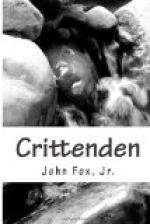“I’ve got it, partner,” he said, “I reckon I’ve got it, sure.” And Grafton saw a drop of blood and the tiny mouth of a wound in his gullet, where the flaps of his collar fell apart. He couldn’t realize how he felt—he was not interested any longer in how he felt. The instinct of life was at work, and the instinct of self-defence. When the others dropped, he dropped gladly; when they rose, he rose automatically. A piece of brush, a bush, the low branch of a tree, a weed seemed to him protection, and he saw others possessed with the same absurd idea. Once the unworthy thought crossed his mind, when he was lying behind a squad of soldiers and a little lower than they, that his chance was at least better than theirs. And once, and only once—with a bitter sting of shame—he caught himself dropping back a little, so that the same squad should be between him and the enemy: and forthwith he stepped out into the road, abreast with the foremost, cursing himself for a coward, and thereafter took a savage delight in reckless exposure whenever it was possible. And he soon saw that his position was a queer one, and an unenviable one, as far as a cool test of nerve was the point at issue. The officers, he saw, had their men to look after—orders to obey—their minds were occupied. The soldiers were busy getting a shot at the enemy—their minds, too, were occupied. It was his peculiar province to stand up and be shot at without the satisfaction of shooting back—studying his sensations, meanwhile, which were not particularly pleasant, and studying the grewsome horrors about him. And it struck him, too, that this was a ghastly business, and an unjustifiable, and that if it pleased God to see him through he would never go to another war except as a soldier. One consideration interested him and was satisfactory. Nobody was shooting at him—nobody was shooting at anybody in particular. If he were killed, or when anybody was killed, it was merely accident, and it was thus pleasant to reflect that he was in as much danger as anybody.
The firing was pretty hot now, and the wounded were too many to be handled. A hospital man called out sharply:
“Give a hand here.” Grafton gave a hand to help a poor fellow back to the field hospital, in a little hollow, and when he reached the road again that black horse and his boy rider were coming back like shadows, through a rain of bullets, along the edge of the woods. Once the horse plunged sidewise and shook his head angrily—a Mauser had stung him in the neck—but the lad, pale and his eyes like stars, lifted him in a flying leap over a barbed-wire fence and swung him into the road again.
“Damn!” said Grafton, simply.
Then rose a loud cheer from the battery on the hill, and, looking west, he saw the war-balloon hung high above the trees and moving toward Santiago. The advance had begun over there; there was the main attack—the big battle. It was interesting and horrible enough where he was, but Caney was not Santiago; and Grafton, too, mounted his horse and galloped after Basil.




